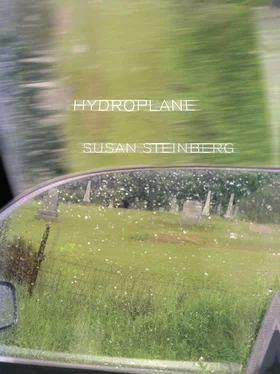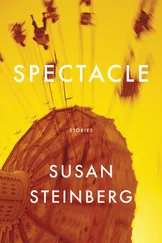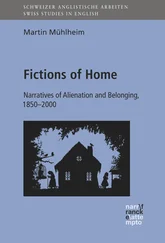Susan Steinberg - Hydroplane - Fictions
Здесь есть возможность читать онлайн «Susan Steinberg - Hydroplane - Fictions» весь текст электронной книги совершенно бесплатно (целиком полную версию без сокращений). В некоторых случаях можно слушать аудио, скачать через торрент в формате fb2 и присутствует краткое содержание. Год выпуска: 2006, Издательство: Fiction Collective 2, Жанр: Современная проза, на английском языке. Описание произведения, (предисловие) а так же отзывы посетителей доступны на портале библиотеки ЛибКат.
- Название:Hydroplane: Fictions
- Автор:
- Издательство:Fiction Collective 2
- Жанр:
- Год:2006
- ISBN:нет данных
- Рейтинг книги:4 / 5. Голосов: 1
-
Избранное:Добавить в избранное
- Отзывы:
-
Ваша оценка:
- 80
- 1
- 2
- 3
- 4
- 5
Hydroplane: Fictions: краткое содержание, описание и аннотация
Предлагаем к чтению аннотацию, описание, краткое содержание или предисловие (зависит от того, что написал сам автор книги «Hydroplane: Fictions»). Если вы не нашли необходимую информацию о книге — напишите в комментариях, мы постараемся отыскать её.
Hydroplane: Fictions — читать онлайн бесплатно полную книгу (весь текст) целиком
Ниже представлен текст книги, разбитый по страницам. Система сохранения места последней прочитанной страницы, позволяет с удобством читать онлайн бесплатно книгу «Hydroplane: Fictions», без необходимости каждый раз заново искать на чём Вы остановились. Поставьте закладку, и сможете в любой момент перейти на страницу, на которой закончили чтение.
Интервал:
Закладка:
There was a time my father would say to me, One day it's yours.
All of it, he would say.
He would gesture to what. A hotel room. A factory. A view. The leather inside of a rented car.
And I would say, I don't want it.
And he would say, You don't know what you want.
And I would say, I know what I don't want.
And he would say, You don't know shit.
And my brother would put his headphones on and turn up the metal and rock his head in a retard way.
And my father would look at me.
And the feeling in my gut.
When my father called England and France he waved us away and mouthed, England, or, France. He said, Go.
Outside goats ate the parking lot weeds. My brother and I threw sticks to the goats. They were so stupid these island goats. Sometimes they ate the sticks. And sometimes they came running at us like dogs.
The ladies' husbands pulled into the lot. They waited in their cars in cotton shirts. They smoked cigarettes down to the filters and flicked their filters to the lot. All of the goats would go after the filters. The husbands never laughed at the goats. Their windows were open even in rain. Fast-speed island music played. When the husbands waved we looked at the ground.
On the low-lit street, the date ran off.
Sure she ran, my father said. She was scared, he said. She's young.
He wore a ski cap, he said. Imagine. A coat.
On an island for God's sake, said my father.
He said, Who wears a coat on an island.
Then pow, said my father.
Sure she ran.
Brass knuckles, he said.
Lousy island, he said.
He pulled my nose.
Eat your eggs, he said.
Maryland. Shaped like a gun. The city not far from the trigger. A house in the city. A bedroom in the house. A bed in the bedroom pushed to the wall. Under the blanket. Morning in winter. A streak of light piercing the curtain. Dust forming in the streak of light. A single dot of dust. Its flight across the room.
On a ride in the sports car, it was me and my father's date in the back.
The best looking one in the factory, he said. Boy look at that body. Out to here.
Look at her body boy, said my father. You won't see that in the States.
My brother sat in the front. He read a comic and listened through headphones.
The spitting image, said my father slapping his back. A son of a gun.
This was a Friday. He drove us to a dinner in the city. We took the highway. We were speeding to get there. The lady drivers were the worst said my father. The ladies shouldn't even have a license, he said. Watch this, he said as he cut one off. Watch this.
They swore in Spanish at my father.
He said, That'll show them to mess with a genius.
A man in San Juan grabbed my father's shirt. He punched my father's face. My father fell.
So this was my father lying in the street. My father with a bloody nose. Blood on his best cotton shirt. My rich white American father, an inventor of something that let people breathe.
This wasn't your father.
I wish it had been yours.
Then I could say the right things to you and we could have a drink and maybe laugh at the thought of your father all fucked up in the street.
But your father would never have been lying on some low-lit street in San Juan.
Your father would never have been bleeding like that, like some stupid fucker, just bleeding like that.
I asked my father about the dust.
I said, Where does it go.
He said, It goes in the filter.
It gets crushed, he said.
Then what, I said.
He said, It stays in the filter.
But what if it gets out, I said.
He said, It won't get out.
I said, But what if rats in the landfills chew through the filters.
He said, Rats cannot chew through the filters.
I said, Yes they can.
He said, No they can't.
I said, Yes they can.
He said, Do you want to be poor.
There was a day my brother and I were looking through my father's failed inventions for no good reason other than my mother would die and she wanted the house clean, and we were cleaning the room where he kept his failed inventions, his assembled bits of wire and foam and string and metal, and we laughed pretty hard when my brother picked up some crazy looking object, an object that looked like a robot built by retard kids, and I remember saying, What the fuck, and my brother said, Look, and put the object on a table and pushed a small red button on its front, and the whole thing shook then split in two.
When my brother and I perched on the monkey bars no one could see us. It was too dark. And we were too high up. Not even the kids who stood below us could see us up there.
The kids were drunk. Sometimes they threw bottles at each other. Sometimes we got sprayed from the crashing bottles.
Sometimes the kids pissed into the sand. They were crazy kids. Girls and boys. And they couldn't see us where we perched.
It was hard not to laugh. We knew we could have scared them. We knew we could have jumped onto their backs. It scared us to think how we could scare them. We could have made them piss their pants.
But we liked the park.
So we held our breath.
We sat, silent, unmoving.
Some masks didn't work. These came back to the island in dirty boxes. Some of the boxes were very small and crammed with masks. The boxes were piled in the factory.
My father would blame the ladies.
You're not sewing them tight, he would say.
Peru would call. And Mexico.
Those days my father slammed his fist to the desk.
He stared at the pile of boxes.
He screamed for hours into the phone.
He would say, You're just not using them right.
Those days my brother watched the ladies work. I sat in the lot with the goats. I waited for the husbands to wait for the ladies.
Mornings in Baltimore. Winter mornings. The curtain pierced by a streak of light. And dust rode on the streak of light. And if I waved my pillow the dust would scatter. I would choose a single dot of dust. It would travel upward like a leaf in a storm. Like a single snowflake in a gust of air. It would pass forever through space and time. This speck of ancient human skin. The air was always full of dust. And nothing could crush it.
On the ride to our dinner in the city my father said, Listen.
He talked of factories in foreign countries.
You don't want to know, he said.
But he at least made a filter to help.
He looked at me in the rearview mirror.
Sweatshops, he said. Now they can breathe.
He said, That's my job.
I looked out at the wilted highway palms.
He said, Listen.
In the rearview mirror he was eyes and eyebrows. A piece of forehead.
He said, There's dangerous dust all around us.
He said, My filter can crush the dust.
It's a killer, he said, pointing his hand like a gun at my brother's head.
The date picked dirt out from under her nails. Her nails were red and very long.
He said, Do me a favor.
He said, Please don't talk.
I'm not talking, I said.
He said, Shut your face.
He said, Don't even start.
Other drivers looked at us. Some were men. Their windows were open, their arms out the windows. Our windows were up.
My father said, What do you know about landfills.
But I wasn't thinking about the rats. About their sharp teeth chewing straight through the filters. The dangerous dust released.
I was watching a kid in the car next to ours. He was in the back seat like I was. He was watching me through the window too, but then he was gone.
My brother said nothing, reading his comic. We could hear his music.
My father said, What does she know. He looked at my brother. He said, Your sister's crazy. He laughed. He nudged my brother's arm.
My brother was off in his own crazy world. Who knew what he thought. His brain was made of dirt. Or shells. Or rotten fruit.
Читать дальшеИнтервал:
Закладка:
Похожие книги на «Hydroplane: Fictions»
Представляем Вашему вниманию похожие книги на «Hydroplane: Fictions» списком для выбора. Мы отобрали схожую по названию и смыслу литературу в надежде предоставить читателям больше вариантов отыскать новые, интересные, ещё непрочитанные произведения.
Обсуждение, отзывы о книге «Hydroplane: Fictions» и просто собственные мнения читателей. Оставьте ваши комментарии, напишите, что Вы думаете о произведении, его смысле или главных героях. Укажите что конкретно понравилось, а что нет, и почему Вы так считаете.












